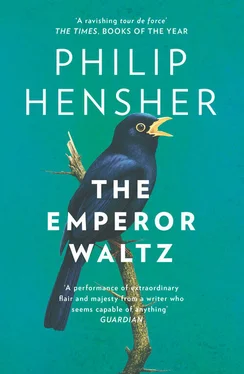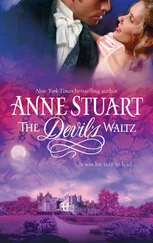Philip Hensher - The Emperor Waltz
Здесь есть возможность читать онлайн «Philip Hensher - The Emperor Waltz» — ознакомительный отрывок электронной книги совершенно бесплатно, а после прочтения отрывка купить полную версию. В некоторых случаях можно слушать аудио, скачать через торрент в формате fb2 и присутствует краткое содержание. Жанр: unrecognised, на английском языке. Описание произведения, (предисловие) а так же отзывы посетителей доступны на портале библиотеки ЛибКат.
- Название:The Emperor Waltz
- Автор:
- Жанр:
- Год:неизвестен
- ISBN:нет данных
- Рейтинг книги:3 / 5. Голосов: 1
-
Избранное:Добавить в избранное
- Отзывы:
-
Ваша оценка:
- 60
- 1
- 2
- 3
- 4
- 5
The Emperor Waltz: краткое содержание, описание и аннотация
Предлагаем к чтению аннотацию, описание, краткое содержание или предисловие (зависит от того, что написал сам автор книги «The Emperor Waltz»). Если вы не нашли необходимую информацию о книге — напишите в комментариях, мы постараемся отыскать её.
The Emperor Waltz — читать онлайн ознакомительный отрывок
Ниже представлен текст книги, разбитый по страницам. Система сохранения места последней прочитанной страницы, позволяет с удобством читать онлайн бесплатно книгу «The Emperor Waltz», без необходимости каждый раз заново искать на чём Вы остановились. Поставьте закладку, и сможете в любой момент перейти на страницу, на которой закончили чтение.
Интервал:
Закладка:
‘I did smoke,’ Samuel said. ‘But before you were born. Before I met your mother, even. It was when I was at school, and when I had my first job. I was a clerk in the office of – of – of – they were Jews. That’s right, they were Jews, the first people I worked for. I smoked because they didn’t, none of them. But it didn’t do me any good. I gave up just before I met your mother and before I went to another job. That was when I realized that I was never going to be promoted in that place. They only promoted their own type.’
‘That must have been fifty years ago,’ Duncan said. He wondered that he did not know that his father had ever smoked. His mother, he was sure, never had. ‘I don’t think you get lung cancer from that, decades later.’
‘They don’t know,’ Samuel said. ‘Doctors never know. I’m glad I’m not in hospital. I’m glad they’re letting me stay here.’
‘Do you remember,’ Duncan said, and Samuel, for the first time, turned his head towards him, and almost smiled. ‘Do you remember that day when you and Mummy and Dommie and I, we went out for the day? I think it must have been for Dommie’s birthday.’
‘I think so,’ Samuel said. His lips were dry and flaking; he was running his tongue over them.
‘Where did we go? Did we go to Whipsnade, or some other zoo, or Box Hill, or was it to the theatre? It would have been a special treat. I don’t know that Whipsnade was open then, come to think of it, so maybe not there. And did you ask Dommie if she’d like to bring ten friends with her? I wish I could remember what her special treat was.’
Samuel turned his head away. ‘When it gets worse,’ he said, ‘they’ll take me into hospital, but I hope I’m not going to know about any of that.’
‘Oh, you’re not going to get any worse than this,’ Duncan said lightly. ‘This is probably it. I wouldn’t have thought you had long to go. About Dommie’s birthday. What was it that we all did together? I think I remember now. She was going to be nine, and you told her that you thought she was too old to have a party, and she couldn’t ask her friends round because it would cost too much and it would be too much noise and trouble. But since you ask, you’re not going to get any worse. You’re probably going to die quite soon.’
Samuel turned his face to Duncan in disbelief. His hollows and unshaven angles said only this: it’s your obligation to do whatever I say. It was not for Duncan to do anything but to give way.
‘So,’ Duncan said. ‘Are you comfortable? Can I do anything for you, in your last hours? Or do you just want me to go away so that you can sit with Rebecca and Ruth and Rachel? I don’t really care.’
‘Oh, you think you’re so clever,’ Samuel said, breathing deeply, the air juddering within. He raised his thin hand to his hairy, bony chest in the gap in his pyjama jacket. ‘That’s what you were always like, showing off. Let me do my dance – I made it up, Mummy. Look, Aunty Rachel, look, Uncle Harold, look at the dolly I made, isn’t it pretty. Oh, yes. I can see you came back to show off and tell me to bugger off before I die. But I can show you one thing.’
There was a long pause; Samuel’s breath guttered and shuddered; he twisted in pain; he pulled at the bedsheets. Duncan waited. He did not want to help his father. He wanted to see how long it would take him to return to the point where he could speak again, or sleep. He watched with interest. In less than five minutes, his father had calmed. Outside the door, a chair scraped against the parquet. Sister Balls must have returned, and be sitting outside. He did not have a lot of time.
‘It hurts to talk,’ Samuel said. ‘There’s one thing I want you to see. In that box, there, on the dressing-table.’
Duncan went over and drew it out. It was a document; a pre-printed form filled in in Samuel’s wavering looping hand, a will. ‘I don’t want to see this,’ Duncan said.
‘Look at it,’ Samuel said.
Duncan did. There was what looked like a duplicate underneath. In a moment he read that his father was leaving his whole estate in equal parts to his two children, his three sisters, his five nephews and nieces, and seven named charities and educational institutions, including the Harrow rugby club, and Harrow School, which neither Duncan nor his father had attended. ‘I see,’ Duncan said. The will, which was to give him, what, a seventeenth part of this ugly house and the bank balance, was dated from two months ago. It was witnessed by a Corinna Balls, and another woman, whose handwriting made Duncan think she was another nurse.
‘You didn’t ask Aunt Rebecca or Aunt Ruth to witness it,’ he said.
‘No, you stupid boy,’ Samuel said. ‘You can’t get people to witness something they’re going to—’ He broke down in coughing.
‘Going to benefit from,’ Duncan said. ‘They’re not going to benefit very much, though, are they?’
‘I think,’ Samuel said. ‘I think – I’m going to cross Domenica out. She hasn’t been to see me. So you’ll get a little bit more. That’ll be nice, won’t it.’
‘And a lawyer’s drawn this up, has he?’ Duncan said. Samuel looked withdrawn and serene. ‘Oh, I see – it’s just something you’ve bought from the newsagent and filled in. Got Sister Balls to get from the newsagent. Something for everyone to discover after you die? I see. You just want people to know that they don’t deserve anything from you.’
Duncan looked at his father. He knew perfectly well that Duncan would take this document and destroy it. It could have no effect on what happened to Samuel’s estate. But before Samuel died, he wanted to make clear to Duncan what he thought of him.
‘The thing is,’ Duncan said, ‘I don’t think that Domenica would take your money anyway. I think she’d probably take however much it was, and hand it over to the NSPCC. Do you think she wants anything to do with you?’
‘I’m her father,’ Samuel said.
‘There was an afternoon, wasn’t there,’ Duncan said, ‘when you said, Let’s all go out swimming, the children and I. Which was odd, because you never suggested anything like that for the children’s pleasure. You know, don’t you, that because Dommie never had any parties after she was eight years old, no one ever thought to ask her to theirs? I don’t suppose you ever thought of that. You only ever wanted to do your own thing. And Dommie said that she couldn’t swim, she didn’t know how, and you said that didn’t matter. You’d gone to the effort of buying her a swimming costume. She didn’t have one. She was only six. And when we all got to the swimming pool, you said to her, This is the way to swim, you know, and you picked her up by her arms and legs and threw her into the deep end, with no floats or anything, and just stood there. The lifeguard jumped in and rescued her. He gave you what for, you horrible old man, asking you what you thought you were doing. Don’t you remember?’
Samuel shook his head demurely. He looked like such a small person, a small entrapped dwarf in a fairytale with a secret.
‘I remember. Even in the 1950s, you didn’t just throw small children into the deep end of swimming pools and wait to see if they drowned or not.’
‘Oh, once,’ Samuel said, shaking his head.
‘Every week,’ Duncan said. ‘Making her wait at the table to eat mutton fat. Making her walk all the way back to school in the dark in January to make her find a pencil case she had dropped. Do you know, you’ve never once given me any help or advice – you’ve never done anything for me, except once. Mummy made you explain to me how to shave. You couldn’t get out of that. That was it. I’m glad you’re dying. It won’t make the slightest difference to anyone. And what’s this rubbish?’ He held up the will. In the light it was a sad object: the handwritten parts were shaky and full of uneven gaps and holes. ‘No one’s going to pay any attention to that. I’m surprised Balls didn’t tell you not to be so stupid. Shall I burn it or shall I just tear it up?’
Читать дальшеИнтервал:
Закладка:
Похожие книги на «The Emperor Waltz»
Представляем Вашему вниманию похожие книги на «The Emperor Waltz» списком для выбора. Мы отобрали схожую по названию и смыслу литературу в надежде предоставить читателям больше вариантов отыскать новые, интересные, ещё непрочитанные произведения.
Обсуждение, отзывы о книге «The Emperor Waltz» и просто собственные мнения читателей. Оставьте ваши комментарии, напишите, что Вы думаете о произведении, его смысле или главных героях. Укажите что конкретно понравилось, а что нет, и почему Вы так считаете.












